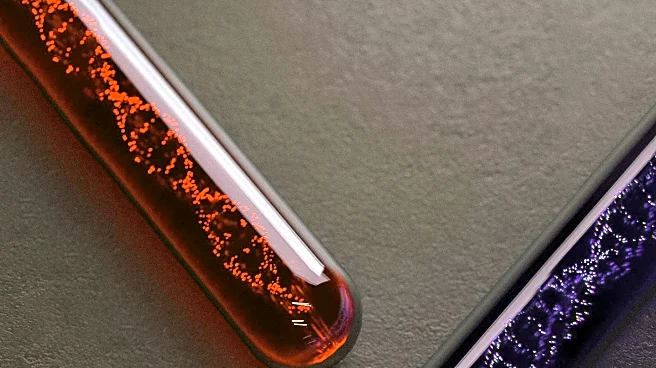What's Happening?
A new blood test developed by GRAIL, Inc., a biotechnology company based in Menlo Park, California, has shown promising results in detecting over 50 types of cancer before symptoms appear. The test, known
as Galleri, was studied by researchers in California who analyzed 23,161 participants aged 50 and older across the US and Canada. These participants underwent standard cancer screenings recommended by the US Preventive Services Task Force, alongside the Galleri blood test. The study found that the Galleri test detected a cancer signal in 216 participants, with 133 confirmed cases of cancer. The test demonstrated a 61.6% accuracy rate for positive results, with a false positive rate of only 0.4%. Notably, more than half of the detected cancers were in early stages, and the test increased cancer detection rates by over seven times when combined with standard screenings.
Why It's Important?
The development of the Galleri blood test represents a significant advancement in cancer detection technology, potentially transforming how cancer is screened at a population level. Early detection is crucial for effective treatment and can significantly reduce the overall cost of cancer care. By identifying cancers at an earlier stage, patients may have better treatment outcomes and improved survival rates. The ability of the Galleri test to pinpoint the origin of the cancer signal with high accuracy further aids in efficient diagnostic processes. This innovation could address unmet screening needs, particularly for cancers that currently lack standard screening options, thereby improving public health outcomes.
What's Next?
Further analysis of the study's full 35,000 participants is anticipated, which will provide more comprehensive data on the test's effectiveness. Additionally, results from the randomized NHS-Galleri test are awaited to offer additional clinical utility data compared to standard care screening alone. As cancers increasingly affect younger populations, discussions may arise regarding the expansion of screening ages and the potential role of the Galleri test in this shift. The integration of this test into existing screening protocols will require careful consideration to ensure it enhances outcomes without adding unnecessary costs or confusion.
Beyond the Headlines
The Galleri test's ability to detect multiple cancers early could lead to ethical discussions about the implications of widespread screening and the management of false positives. The test's introduction may also prompt debates on healthcare policy, particularly regarding insurance coverage and access to advanced diagnostic tools. Long-term, this innovation could shift cultural perceptions of cancer screening and prevention, emphasizing the importance of early detection and proactive health management.









